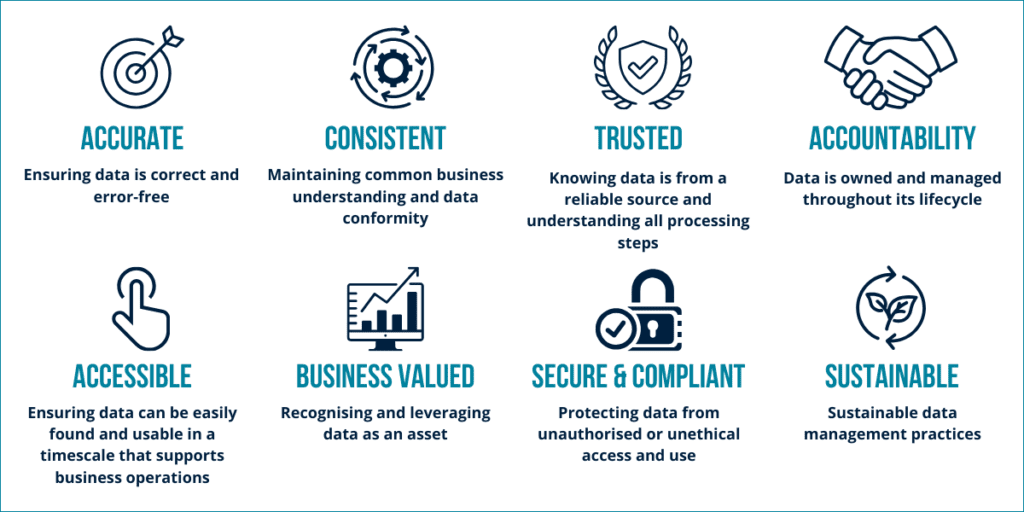In today’s digital and AI driven business world, data is the engine powering organisational success. However, many businesses find managing their data effectively to be complex and time-consuming.
At Reach our mission is to make data simple to understand. We want to help organisations focus on what they do best—delivering exceptional service for their customers—without getting bogged down by managing their data.
We believe a Data Managed Service, which brings specialised data support on an outsourced basis, will be an ideal approach for many businesses. This allows focus on core business activities with confidence their data is under control and bringing greatest value to their organisation.
In this blog we set out where we think organisations can benefit most from a Data Managed Service and what a service would look and feel like. We have also provided a comparison to other types of Managed Service that may be more familiar to readers.
Why you need a Data Managed Service
Many organisations are unaware of the full extent of their data challenges until they try to use their data for new digital services, reporting, or analytics. Poor data can have a significant negative impact on overall business performance:
- Missed opportunities: without high-quality, well-managed data, you might miss crucial insights that could drive growth. For example, poor data management can lead to missed trends in customer behaviour, resulting in lost sales opportunities and reduced market competitiveness.
- Increased risks: inaccurate or incomplete data can lead to poor decision-making, which increases operational risks. In sectors such as Health, this can result in patient safety issues, regulatory non-compliance, and significant financial penalties. Poor data quality can also lead to reputational damage if errors are exposed publicly.
- Operational inefficiencies: poor data processes can cause inefficiencies, such as duplicated efforts, wasted resources, and delays in service delivery. This inefficiency can frustrate staff and customers, reducing overall productivity and satisfaction. Additionally, poor quality data in operational systems can lead to errors in day-to-day operations, causing a ripple effect that impacts overall business performance.
- Regulatory compliance: failing to properly manage data can lead to non-compliance with data regulations such as GDPR which can result in fines and reputational damage. There are further regulations on the horizon with Environmental, Social and Governance (ESG) regulations requiring access to data which is currently not accessed and largely unmanaged.
What are the benefits of a Data Managed Service
- Data Confidence: confidence that you’re in control of your data, ensuring you are maximising the value you can achieve. A Data Managed Service gives you peace of mind, knowing that your data is being managed by experts in your data to agreed standards, allowing you to focus on what you do best.
- Cost Efficiency: building and maintaining an in-house data management team can costly. A Data Managed Service provides expert support and advanced technologies more cost effectively than an in-house team.
- Right Data, Right Time, Right Place: ensuring data is available when and where it’s needed is critical. This includes operational systems as well as data for reporting, analytics, and AI. A Data Managed Service ensures your data is well-managed and ready to use, delivering the benefits you expect from your technology investments.
- Delivering Business Benefits from your Data: focus on delivering outcomes that positively impact your business. A Data Managed Service brings a continuous focus on data improvement, working closely with business teams to identify practical improvements and delivering those enhancements. This approach ensures your organisation continually gains value from your data.
- Guiding Strategy: support setting and executing the right Data Strategy and achieving measurable results. A Data Managed Service helps bring innovation, allowing you explore new opportunities and stay ahead of the competition.
- Ensuring Compliance: Data privacy and regulatory compliance are non-negotiable. A Data Managed Service keeps you updated with the latest requirements and ensures your data practices meet all necessary standards.
- Building Data Communities and Promoting Data Literacy: beyond managing your data, a Data Managed Service creates data communities within your organisation. By promoting data literacy programs everyone, from Execs to frontline staff, can understand and use data effectively.
Data Managed Service: Focusing on What Matters
Our approach to a Data Managed Service is grounded in our Business Ready Data Principles. These principles help us define what good looks like for our customers and allows us to focus on delivering the outcomes they need. You can see our previous blog on defining Business Ready Data for a description of the principles.

These principles help our customers identify where to invest in data capabilities that provide clear business value. For example, within ‘Business Valued’, investing in roles combining business acumen with data expertise with the objective of transforming the decision-making process. In other areas, such as ‘Accessible’, there may be greater business benefit from a Data Managed Service that looks after the Data Warehouse and associated data integrations for you.
A Data Managed Service can span the full data life cycle ensuring everything runs seamlessly or focus on specific Data Principles. The shape of the Managed Service is aligned to your needs, and you are in complete control, deciding how hands on you want to be.
Which Organisations Benefit the Most?
We think Data Managed Services are particularly beneficial for several types of organisations:
- Organisations not interested in creating a Data Capability: Some businesses may recognise the importance of data but are not interested in developing an in-house data capability. A Data Managed Service allows these organisations to leverage high-quality data management without the need to build and maintain their own data teams.
- Organisations where the breadth and number of resources are unaffordable: small and medium sized organisations may find it challenging to afford the full spectrum of data resources required for effective data management. These businesses might only need part-time resources or specialised skills on an ad-hoc basis. A Data Managed Service provides access to a comprehensive suite of data capabilities, tailored to their specific needs, without the financial burden of full-time salaries and benefits.
- Rapidly growing organisations: companies experiencing rapid growth often need to scale their data capabilities quickly to keep up with business demands. A Data Managed Service provides the flexibility and scalability needed to manage increasing volumes of data and complexity without the delays and costs associated with hiring and training new staff.
More Than Augmented Resources
We do not see a Data Managed Service as simply adding extra hands; we take full responsibility for running the processes that make your data work. There will be a focus on outcomes and business benefits, clearly demonstrating the value of a Managed Service.
Comparisons to Other Managed Services
To put a Data Managed Service into perspective, we can compare it to other common managed services:
- IT Managed Service: IT managed services ensure your systems are available when you need them, providing reliability, uptime, and professional IT support. Similarly, a Data Managed Service ensures Business Ready Data is available when and where you need it, enhancing reliability and accessibility.
- HR Managed Service: HR managed services handle key processes such as payroll, ensuring efficiency, accuracy, and compliance. A Data Managed Service manages data processes, ensuring data quality, compliance, and accessibility, which in turn improves operational efficiency.
- Local Government Services (e.g., Council Tax or Benefits Management): Local Government often outsources services such as Council Tax or Benefits Management to specialised providers. These providers ensure that processes are handled efficiently, regulations are adhered to, and services are delivered seamlessly to the public. Similarly, a Data Managed Service manages your data processes, ensuring compliance, efficiency, and reliability.
Conclusion
At Reach, we understand the challenges organisations face in managing their data. Our Data Managed Service alleviates these burdens, providing a comprehensive, cost-effective solution that enhances decision-making, ensures compliance and ultimately instils confidence in your data.
Let us handle your data so you can focus on what really matters to you. Contact us today to discover how our Data Managed Service can transform your organisation and drive your success.




